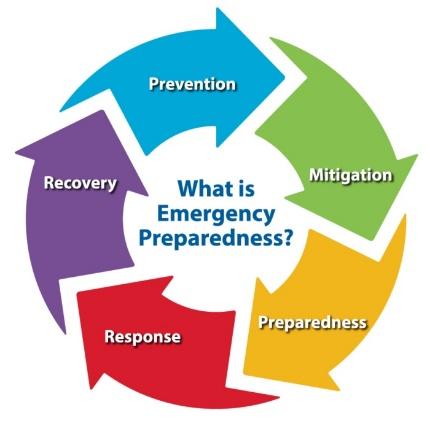
By Cindra M. James, MPA, Former Washtenaw County Health Department Emergency Preparedness Administrator
What is your job?
I’m an Emergency Preparedness Professional. I retired from Washtenaw County Health Department in 2022, and I’ve stayed connected to this field by working on projects with community partners. A career in emergency preparedness as an administrator, director, or specialist, allows a person to use a skill set that creates plans, provides training and exercises with internal and external partners, creates relationships with other response partners, and helps the population prior to and during an emergency understand how we will help protect them, and how they can help protect themselves.
How long have you been working in this field?
I’ve been in this field for 20+ years; 2.5 years at Wayne County Health Department and 17.5 at Washtenaw County Health Department.
What level of education or training does this position require?
Most agencies/departments/organizations will accept a bachelor’s degree, but they would like it if you have a master’s—preferably in public health. My undergrad degree is in biology, and my master’s is in public administration. Having worked in public health, including environmental health for 25 years health, I chose to get a MPA, to broaden my knowledge in public administration and become more well-rounded.
What skills are needed to do this job well?
There are a variety of skills needed to do this job well; some are learned while at school, and others are inherent or practiced skills. I’ve found being calm, organized, confident, decisive, and great at listening to be helpful. Also having the ability to multi-task, learn new things, lead, and see the big picture while keeping track of the details is important.
What is a typical day like for this career?
Typical days in emergency preparedness can look different depending on what’s going on in the outside world. On a calm day, with no large events, it can be keeping your EOP (emergency operation plan) updated; this can be tedious but necessary for when events do happen. A regular day might include doing presentations, trainings or exercises, providing outreach to different groups, attending a meeting, or sitting on a board/committee/coalition as the department’s representative. On less than calm days (read: COVID-19 or any other large communicable disease outbreak, chemical or environmental event, etc.), your day may include update briefings, working with other response agencies, assisting with communications to others (internally, externally, or both), and possibly sitting at the emergency operation center which aims to provide a coordinated response. This career is rarely boring, and if you start to think it is, something new comes along.
Do you tend to work more independently or with other people?
It is about 50-50. A lot of the work is done independently—writing plans, doing reports, developing trainings or exercises. Having said that, the work you’ve done independently must be shared with others. For example, it does no good to develop plans and not train other responders on their role, and then doing an exercise to make sure the plans work. Planning, training, and conducting practice exercises, allows for quality improvements, and being your best when an event happens… and it will.
What do you wish you would have known about your job before starting?
I started working in preparedness in its infancy, shortly after 9/11. The traditional first responders, police and fire, were the public face of response to this terrible event. While public health has always provided a response to public health emergencies (i.e., smallpox, Spanish and Swine influenza, anthrax), a lot of response agencies didn’t think of public health as a first responder. What I wish I would have known about before starting my job was that I would spend the first few years educating others on what public health is and does.
What’s your least favorite thing about this job?
My least favorite thing about the job was updating our communication plan. The communication plan has the who, what, why, and when communications go out to internal staff and departments, as well as to external entities, including healthcare agencies, EMS, state offices, media, and the public. This can take a lot of time if things have changed, or you have adopted a new policy/procedure. Updating the majority of the plan was fine; updating the gazillion contact lists was tedious.
What’s your favorite thing about this job?
My favorite thing about the job was all of the great people I got to work with. The two other favorite things I enjoyed were doing community outreach, and working on climate change projects. Eleven years ago, the Emergency Preparedness program conducted a survey with residents to see how aware they were and prepared for extreme heat events; a follow-up survey was done in the spring/summer of 2022. The findings were similar in that people are not prepared for extreme weather events. I also enjoyed doing a presentation for the last 13 years titled, “Climate Change and Public Health”, to a class on Sustainability and Health at the University of Michigan.
What advice would you give people who are interested in going into this field?
The advice I would give to people interested in this field is to present a calm presence in the face of unknowns. Internally, you may be freaking out (been there, done that), but those depending on you want to see that everything will be okay, or at least not so bad. The other advice I would give is for the individual to network and get to know all of your community, regional, state, and federal partners; this includes first responders and non-response partners.
